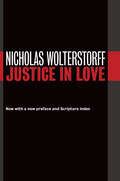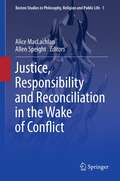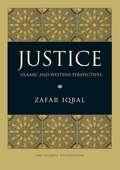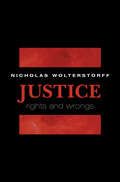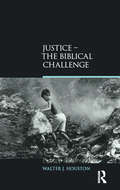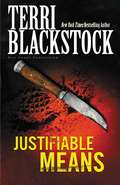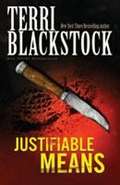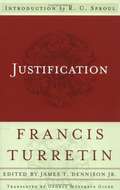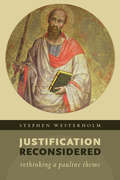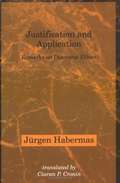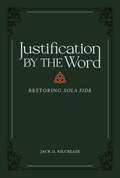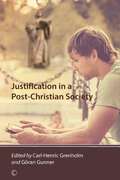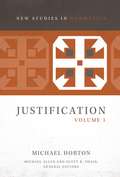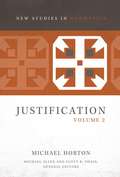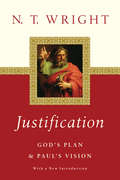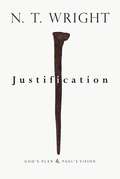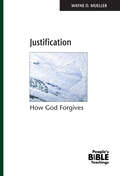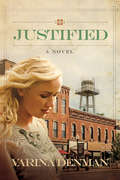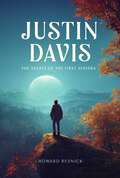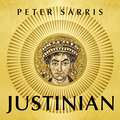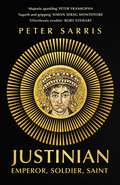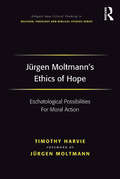- Table View
- List View
Justice in Love: Essays On Justice, Art, And Liturgy (Emory University Studies in Law and Religion (EUSLR))
by Nicholas WolterstorffAn eminent Christian philosopher's take on justice, rights, wrongs -- and what love has to do with it allLove and justice have long been prominent themes in the moral culture of the West, yet they are often considered to be almost hopelessly at odds with one another. In this book acclaimed Christian philosopher Nicholas Wolterstorff shows that justice and love are at heart perfectly compatible, and he argues that the commonly perceived tension between them reveals something faulty in our understanding of each. True benevolent love, he says, is always attentive to justice, and love that wreaks injustice can only ever be "malformed love." Wolterstorff's Justice in Love is a welcome companion and follow-up volume to his magnificentJustice: Rights and Wrongs (Princeton, 2010). Building upon his expansive discussion of justice in that earlier work and charitably engaging alternative views, this book focuses in profound new ways on the complex yet ultimately harmonious relation between justice and love.
Justice, Responsibility and Reconciliation in the Wake of Conflict
by Allen Speight Alice MaclachlanWhat are the moral obligations of participants and bystanders during--and in the wake of -a conflict? How have theoretical understandings of justice, peace and responsibility changed in the face of contemporary realities of war? Drawing on the work of leading scholars in the fields of philosophy, political theory, international law, religious studies and peace studies, the collection significantly advances current literature on war, justice and post-conflict reconciliation. Contributors address some of the most pressing issues of international and civil conflict, including the tension between attributing individual and collective responsibility for the wrongs of war, the trade-offs made between the search for truth and demands for justice, and the conceptual intricacies of coming to understand just what is meant by 'peace' and 'conflict.' Individual essays also address concrete topics including the international criminal court, reparations, truces, political apologies, truth commissions and criminal trials, with an eye to contemporary examples from conflicts in the Middle East, Africa and North and South America.
Justice: Islamic and Western Perspectives
by Zafar IqbalA thought-provoking monograph which provides a systematic and rigorous exposition of a range of social, economic and political views from the vantage point of Islam. Humanity is in a state of confusion and is torn apart by conflicting claims of civilization superiority. In the context of current misunderstanding on the east-west relationship, this comparative study will help to alleviate hostilities.
Justice: Rights and Wrongs
by Nicholas WolterstorffWide-ranging and ambitious, Justice combines moral philosophy and Christian ethics to develop an important theory of rights and of justice as grounded in rights. Nicholas Wolterstorff discusses what it is to have a right, and he locates rights in the respect due the worth of the rights-holder. After contending that socially-conferred rights require the existence of natural rights, he argues that no secular account of natural human rights is successful; he offers instead a theistic account. Wolterstorff prefaces his systematic account of justice as grounded in rights with an exploration of the common claim that rights-talk is inherently individualistic and possessive. He demonstrates that the idea of natural rights originated neither in the Enlightenment nor in the individualistic philosophy of the late Middle Ages, but was already employed by the canon lawyers of the twelfth century. He traces our intuitions about rights and justice back even further, to Hebrew and Christian scriptures. After extensively discussing justice in the Old Testament and the New, he goes on to show why ancient Greek and Roman philosophy could not serve as a framework for a theory of rights. Connecting rights and wrongs to God's relationship with humankind, Justice not only offers a rich and compelling philosophical account of justice, but also makes an important contribution to overcoming the present-day divide between religious discourse and human rights.
Justice: The Biblical Challenge (Biblical Challenges in the Contemporary World)
by Walter J. HoustonWhat does the Bible have to say about justice, and what relevance has this for people, particularly Christians, today? 'Justice: The Biblical Challenge' offers readers a balanced assessment of the biblical treatment of justice and what we might learn from this. The book opens with a brief overview of the differing social contexts which shaped how people thought about justice in biblical times. The examples of justice are grouped under three key narratives: the story of creation (justice as cosmic order), the story of the Exodus (justice as faithfulness), and the story of Israel (justice as a community of equals). The story of Jesus in Mark is then examined as exemplifying all three narratives. The book then applies these biblical stories to the world we live in now, applying an innovative 'justice audit' which uses the three biblical narratives of justice as yardsticks. The book concludes with an exploration of how readers might apply the ideas raised in the book to working for justice.
Justifiable Means
by Terri BlackstockA violent criminal with a knack for evading justice. A beautiful victim with a secret to hide. Between them stands one good cop, torn between justice and the law. This rape case is an exception: The victim is more than willing to testify. And there’s abundant evidence to put the suspect behind bars. Just one thing bothers Detective Larry Millsaps. Young and beautiful Melissa Nelson seems to know almost too much about the evidence needed to convict her attacker. The unfolding investigation unearths a brutal track record on the part of the suspect . . . and a stunning revelation of Melissa’s own haunting past that could do far worse than destroy her credibility. Caught in a deadly conflict between the ironies of the law and the demands of his Christian convictions, Millsaps finds himself protecting Melissa from a psychopathic stalker’s lethal game of cat-and-mouse . . . even as evidence collects that could send to prison not an inhuman criminal, but the woman Millsaps has come to love. Justifiable Means is the second book in the Sun Coast Chronicles by award-winning author Terri Blackstock. From absorbing legal drama to lightning-paced action, the Sun Coast Chronicles offers suspense at its finest, tempered with remarkable realism and penetrating insights into the human heart. Look for Evidence of Mercy, Presumption of Guilt, and Ulterior Motives at your favorite bookstore.
Justifiable Means (Sun Coast Chronicles #2)
by Terri BlackstockThis rape case is an exception: The victim is more than willing to testify. And there's abundant evidence to put the suspect behind bars. Just one thing bothers Detective Larry Millsaps. Young and beautiful Melissa Nelson seems to know almost too much about the evidence needed to convict her attacker. The unfolding investigation unearths a brutal track record on the part of the suspect...and a stunning revelation of Melissa's own haunting past that could do far worse than destroy her credibility. Caught in a deadly conflict between the ironies of the law and the demands of his Christian convictions, Millsaps finds himself protecting Melissa from a psychopathic stalker's lethal game of cat-and-mouse...even as evidence collects that could send to prison not an inhuman criminal, but the woman Millsaps has come to love.
Justification
by Francis TurretinTurretin's contemporaries celebrated not only his erudition, but also his eloquence and his ministries of mercy. His pastor's heart made him an evangelist who pled with sinners to be reconciled with God. "If we hold sacred the notion that God has created us with minds for the purpose of seeking understanding
Justification Reconsidered: Rethinking A Pauline Theme
by Stephen WesterholmMuch has been written of late about what the apostle Paul really meant when he spoke of justification by faith, not the works of the law. This short study by Stephen Westerholm carefully examines proposals on the subject by Krister Stendahl, E. P. Sanders, Heikki Raisanen, N. T. Wright, James D. G. Dunn, and Douglas A. Campbell. In doing so, Westerholm notes weaknesses in traditional understandings that have provoked the more recent proposals, but he also points out areas in which the latter fail to do justice to the apostle.Readers of this book will gain not only a better grasp of the ongoing theological debate about justification but also a more nuanced overall understanding of Paul.
Justification and Application: Remarks on Discourse Ethics
by Jürgen Habermas Ciaran P. CroninThis collection of four essays and an interview contains Habermas's most recent contributions to ethical theory. It expands and clarifies the work on discourse ethics presented in Moral Consciousness and Communicative Action. Here, largely in response to criticisms from contemporary neo-Aristotelians, Habermas underscores the claim of discourse ethics to a preeminent position in contemporary moral philosophy with incisive analyses and refinements of the central concepts of his theory that include important developments in his treatment of practical reason and of the problems of application and motivation. The first essay offers a comprehensive analysis of practical rationality, which establishes a clear demarcation between pragmatic, ethical, and moral questions and a corresponding differentiation between forms of volition and spheres of practical discourse. The centerpiece of the book is a multifaceted defense of the central claims of discourse ethics incorporating masterly critiques of the major competing positions, including those of John Rawls, Bernard Williams, Charles Taylor, Alasdair MacIntyre, Karl-Otto Apel, and Albrecht WellmerThe middle essays defend the basic intention of universalist moral theory in the face of the claims of the neo-Aristotelian ethics of the good and Horkheimer's skepticism toward reason that led him to embrace a religiously inspired ethic of compassion. An interview with Habermas covering such topics as the genesis of discourse ethics, the precise import of some of its more controversial elements, and its interconnections with the theory of communicative actions concludes this important collection. Jürgen Habermas is Professor of Philosophy at the University of Frankfurt.
Justification by the Word: Restoring Sola Fide
by Jack D. KilcreaseGod's Word creates what he commands In Justification by the Word, Jack D. Kilcrease reintroduces Martin Luther's key doctrine. Though a linchpin of the Reformation, Luther's view of justification is often misunderstood. For Luther, justification is an expression of God's creative Word. To understand Luther on justification, one must grasp his doctrine of the Word. The same God who declared "let there be light"—and it was so—also declares "your sins are forgiven." Justification is an objective reality. It is achieved in Christ's resurrection and received through an encounter with the risen Christ in Word and sacrament. Justification turns us outward, away from our own unsteady feelings and limited understanding, to look to Christ. And the church must preach justification, lest we so easily forfeit the joy of the gospel. Justification by the Word inspires readers to reencounter the radical doctrine of justification by faith alone.
Justification in a Post-Christian Society
by Carl-Henric Grenholm Göran GunnerSince the Reformation in the sixteenth century, Lutheran traditions have impacted culture and politics in many societies. At the same time, Lutheran belief has had an effect on personal faith, morality, and ethics. Modern society, however, is quite different from that at the time of the Reformation. How should we evaluate Lutheran tradition in today's Western multicultural and post-Christian society? Is it possible to develop a Lutheran theological position that can be regarded as reasonable in a society that evidences a considerable weakening of the role of Christianity? What are the challenges raised by cultural diversity for a Lutheran theology and ethics? Is it possible to develop a Lutheran identity in a multicultural society, and isthere any fruitful Lutheran contribution to the coexistence of diff erent religious and non-religious traditions in the future?
Justification, Volume 1 (New Studies in Dogmatics)
by Michael Allen Michael Horton Scott R. SwainThe doctrine of justification stands at the center of our systematic reflection on the meaning of salvation as well as our piety, mission, and life together. In his two-volume work on the doctrine of justification, Michael Horton seeks not simply to repeat noble doctrinal formulas and traditional proof texts, but to encounter the remarkable biblical justification texts in conversation with the provocative proposals that, despite a wide range of differences, have reignited the contemporary debates around justification.Volume 1 engages in a descriptive task - an exercise in historical theology exploring the doctrine of justification from the patristic era to the Reformation. Broadening the scope, Horton explores patristic discussions of justification under the rubric of the "great exchange." He provides a map for contemporary discussions of justification, identifying and engaging his principal interlocutors: Origen, Chrysostom, Augustine, Thomas Aquinas, John Duns Scotus, William of Ockham, Gabriel Biel, and the magisterial reformers. Observing the assimilation of justification to the doctrine of penance in medieval theology, especially via Peter Lombard, the work studies the transformations of the doctrine through Aquinas, Scotus and the nominalists leading up to the era of the Reformation and the Council of Trent. He concludes his first study by examining the hermeneutical and theological significance of the Reformers’ understanding of the law and the gospel and the resultant covenantal scheme that became formative in Reformed theology. This then opens the door to the constructive task of volume 2 - to investigate the biblical doctrine of justification in light of contemporary exegesis.
Justification, Volume 2 (New Studies in Dogmatics)
by Michael Allen Michael Horton Scott R. SwainThe doctrine of justification stands at the center of our systematic reflection on the meaning of salvation as well as our piety, mission, and life together. In his two-volume work on the doctrine of justification, Michael Horton seeks not simply to repeat noble doctrinal formulas and traditional proof texts, but to encounter the remarkable biblical justification texts in conversation with the provocative proposals that, despite a wide range of differences, have reignited the contemporary debates around justification.Building on his historical-theological exploration of justification in volume 1, in this second volume Horton embarks upon a constructive task of investigating the biblical doctrine of justification in light of contemporary exegesis. Here he takes up the topic of justification from biblical-theological, exegetical, and systematic-theological vantage points, engaging significantly with contemporary debates in biblical, especially Pauline, scholarship. Horton shows that the doctrine of justification finds its most ecumenically-significant starting point and proper habitat in union with Christ, where the greatest consensus, past and present, is to be found among Orthodox, Roman Catholic, and Protestant theologies. At the same time, he proposes that the union with Christ motif achieves its clearest and most consistent articulation in forensic justification. The final chapter locates justification within the broader framework of union with Christ.
Justification: God's Plan and Paul's Vision
by N. T. WrightThis sprightly and gracious yet robust work is Tom Wright's carefully argued and scripturally based response to those who think that he has deeply misunderstood Paul's doctrine of justification. Book jacket.
Justification: How God Forgives (People's Bible Teachings)
by Wayne D MuellerHow can God forgive me?Many people—Christians and non-Christians alike—believe that they need to do something to earn God’s love and forgiveness. That’s how the rest of the world works. Why should God be any different?Justification shows how very different God is from people. And what a good thing that is for you and me! While God certainly desires that we live out our faith in love to other people, no certain amount of good works is necessary to earn God’s love or forgiveness! He forgives freely—no strings attached.This book reaffirms the biblical proclamation of justification: You are saved by God’s grace through God-given faith in Jesus Christ and what he has done for you.If you’re looking for comfort or asking the question, “How can God forgive me?” then this book is for you.
Justified
by Varina DenmanIn a small Texas town ruled by gossip, Fawn Blaylock believes others are justified in condemning her untimely pregnancy. Stifled by guilt, she yearns for grace while the local football coach treats her with gentle respect.Justified perfectly captures the rhythm and romance of life in a small town, telling the unforgettable story of a woman searching for renewal, a man looking beyond what others see, and a community torn between judgment and love. It is the unforgettable story of broken dreams, second chances, and relentless hope.
Justin Davis: The Secret of the First Avatara
by Howard ResnickA Simon & Schuster eBook. Simon & Schuster has a great book for every reader.
Justinian: Emperor, Soldier, Saint
by Professor Peter SarrisThe definitive life story of the Roman Emperor who shaped modern times.In this groundbreaking new biography of Justinian, Peter Sarris gives us an intimate insight into both the Emperor and the man. We meet a man who from the humblest beginnings, rose to become ruler of much of the known world achieving an almost god-like status. An emperor who infused even the most mundane tasks with spiritual and religious significance. A gifted administrator obsessed with detail. A middle aged lover who fell for a dancing girl and changed the law so he could marry her, ruling with Empress Theodora by his side for over twenty years. A brilliant military strategist who was never a soldier. The challenges he faced - climate change, battles over culture and identity, the first recorded global pandemic -and many of the solutions he found to address them still resonate with us today. And his legacy remains all around us, in the massive building programme of which the most beautiful manifestation is surely Hagia Sophia; in our legal systems through the codification of the Corpus juris civilis; and in our culture and history by making a fundamental contribution to both the formation of Christendom and the emergence of Islam. In this tour de force Peter Sarris shows us that in all his complexity and contradictions Justinian was, in many ways, a very modern Emperor.(P)2023 Hodder & Stoughton Limited
Justinian: Emperor, Soldier, Saint
by Professor Peter Sarris'A majestic, sparkling account of one of the most important rulers in history . . . this is modern history writing at its finest' Peter Frankopan'Superb and gripping. Epic historical biography that brings the emperor to life . . . filled with new ideas and revelations' Simon Sebag Montefiore'Effortlessly erudite, lucidly written, with a sharp eye for the telling detail, Sarris has written the great biography of the greatest of the Byzantine emperors' Rory StewartIn this groundbreaking new biography of Justinian, Peter Sarris gives us an intimate insight into both the Emperor and his times. We meet a man who from the humblest beginnings, rose to become ruler of much of the known world achieving an almost god-like status. An emperor who infused even the most mundane tasks with spiritual and religious significance. A gifted administrator obsessed with detail. A middle aged lover who fell for a dancing girl and changed the law so he could marry her, ruling with Empress Theodora by his side for over twenty years. A brilliant military strategist who was never on the frontline. The challenges he faced - climate change, battles over culture and identity, the first recorded global pandemic -and many of the solutions he found to address them still resonate with us today. And his legacy remains all around us, in the massive building programme of which the most beautiful manifestation is surely Hagia Sophia; in our legal systems through the codification of the Corpus juris civilis; and in our culture and history by making a fundamental contribution to both the formation of Christendom and the emergence of Islam. In this tour de force Peter Sarris shows us that in all his complexity and contradictions Justinian was, in many ways, a very modern Emperor.
Jy is nie veronderstel om van die Geheime van die Jode te weet nie
by Bernard Levine Adri Van SchalkwykJy sal beslis verbaas wees, dalk selfs geskok wees as jy ontdek wat regtig aangaan in die Joodse wêreld. Het jy geweet dat die Jode nie toegelaat word om toiletpapier op die Sabbat te skeur nie? Hoekom kan Joodse vrouens nie Bybel lees nie? Het jy al gehoor daar is spesiale Coca-Cola net vir Jode? Wat is die naam van Jesus? Watter letter van die alfabet is onderstebo in die Bybel geskryf? Waarom Jode nie kaasburgers eet nie? Wat is so anders oor Joodse seksuele omgang? Waarom Joodse vrouens pruike dra? Is daar ʼn spesiale gebed wat Jode sê voor hul toilet toe gaan? Die meeste van die Ou Testament word nie deur Jode bestudeer nie ... hoekom? Het jy geweet dat Jode hul eie soort spek het? Hoekom word Joodse vroue nie toegelaat om hul elmboë of knieë vir mans te wys nie? Wat is God se naam wat uit die meeste Bybels gelaat word? Mag ʼn Jood ʼn tatoeëring hê? Wanneer slaap Jode buite? Is dit waar dat daar geen vloekwoorde in Hebreeus is nie? Hoe moet jy ʼn Jood van Jesus Christus vertel? Hoekom kan Jode nie hul eie woorde gebruik wanneer hulle bid nie? Jy sal beslis verbaas wees, dalk selfs geskok wees wanneer jy ontdek wat regtig aangaan in die Joodse wêreld.
Já ouviu falar que serão entregues prêmios no céu?: Receberás um prêmio?
by Bernard LevineSe Deus nos revelasse as glórias que nos esperam, seria uma surpresa e tanto! Que prêmios receberás no céu? Receberás um prémio? Se tivermos servido fielmente o Senhor Jesus, este será um tempo de grande alegria, porque receberemos recompensas maravilhosas
Jüdisch-Muslimische Beziehungen im Wandel der Zeit
by Ednan Aslan Margaret RauschDieser multidisziplinäre Band vereint Forschungsarbeiten zu verschiedenen Aspekten der jüdisch-muslimischen Beziehungen, des Austauschs und der Koexistenz im Laufe der Zeit, darunter das Rätsel der abrahamitischen Tradition, Juden im Koran und im Hadith, Ibn al-'Arabi und die Kabbala, vergleichende feministische Theologie, Juden, Christen, Muslime und das Barnabas-Evangelium, die Harmonisierung von Religion und Philosophie in Andalusien, Juden und Muslime im christlichen Spanien des Mittelalters, israelische Juden und muslimische und christliche Araber, die jüdisch-muslimische Koexistenz auf Zypern, muslimisch-jüdische Dialoge in Berlin und Barcelona, jüdisch-christlich-muslimische Triloge und Teleologie, jüdische und muslimische Speisegesetze sowie jüdische und muslimische Integration in der Schweiz und in Deutschland.
Jürgen Moltmann's Ethics of Hope: Eschatological Possibilities For Moral Action (Routledge New Critical Thinking in Religion, Theology and Biblical Studies)
by Timothy HarvieThis book develops a thorough account of the sphere of human moral action in sustained dialogue with Jürgen Moltmann. By examining God's role as promise-giver, particularly in the Christian understanding of resurrection, this work describes the occupancy of both history and space in moral terms. This leads to an understanding of Jesus' description of 'the kingdom of God' to feature prominently in describing both the possibility and content of human moral action. By offering an account of each of the main doctrines found in Moltmann's corpus - the role of the future, the Trinity, the Holy Spirit, and anthropology - this book locates how each contributes to the understanding of ethics from a Christian perspective and subsequently applies these findings to the contemporary issue of poverty and global economics.
